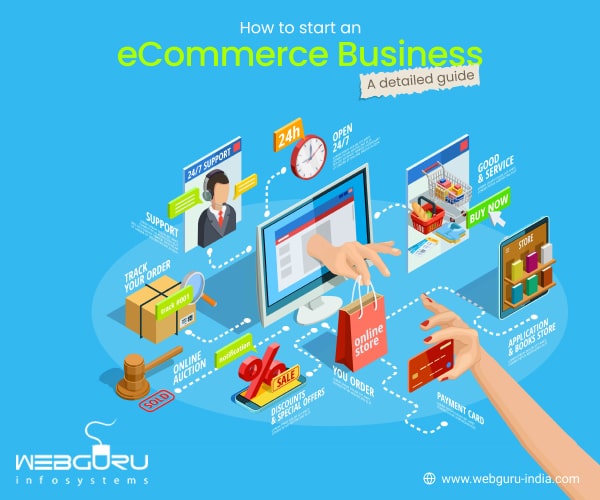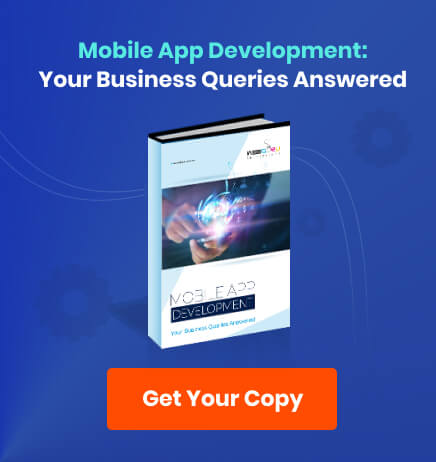Home Blog Ecommerce Website Development How to Start an eCommerce Business- A Detailed Guide
How to Start an eCommerce Business- A Detailed Guide
- 13 Aug / 2021
- 2,223 views

So, you have finally decided to bring your brick-and-mortar store online? Congratulations! When the whole world is getting digital, this decision can take your business to the next level. An eCommerce business offers you immense potential and visibility in front of millions of users; you just have to adopt the right strategy.
According to a report from the U.S. Census Bureau, by 2023, e-commerce revenue is expected to touch $740 billion in the U.S. alone. Now, that’s some serious potential to start your online business and carve out its own niche in the marketplace. However, going live with a dynamic eCommerce website is not as easy as it sounds. Its success depends on the features and functionalities it offers. This guide will show you how to start your online store. Take a look now!
1. Select a Business Model
Selecting a business model is crucial as it will determine the type of website you need. Depending on your business model, you can build either a single vendor or a multi-vendor eCommerce store.
- Single Vendor Marketplace: It represents an eCommerce store where an individual brand sells products to the target customer. There are only two parties involved in this buying and selling process, i.e. the buyer and the seller.
- Multi-Vendor Marketplace: It refers to an eCommerce store that is controlled by an administrator and multiple sellers can register and sell their products. Here, customers come to the marketplace and get the chance to purchase the products from distinct vendors. Example? Amazon.
Also, before you start building your online store, you are required to do thorough competitor analysis so as to point your efforts towards the right direction.
2. Choose Target Audience
What demographic are you targeting? Who is your ideal customer? To solicit sales and scale your business, try to clearly understand who your target audience is. Learn about their requirements & preferences.
Here, creating a buyer persona can be helpful. It is a generalized, fictional representation of a demographic you are looking to target.
3. Market Research
Market research helps you to understand the depth, competitiveness, and profitability of the business vertical you have selected. It’s simple; you obviously don’t want to initiate an offer that no one is interested in buying. Take a look at some market research techniques:
- Check the SERPs: Analyze the variants of your products available online. This will help you to understand what businesses are on the top of organic search results.
- Analyze Keywords: Tools like Google Trends and Analytics can help you to find out the keywords used most commonly while searching for the products you sell. Targeting the right keyword will help your site to appear when people look for a similar product.
4. Establish your Brand & Logo
Starting an eCommerce business from scratch means paying attention to every element of its branding such as your store’s name and the business logo. So, once you have decided on the plan for your e-commerce business, the next step is to choose a name that clearly indicates what your business is about.
Engage a logo design company that will deliver a memorable logo for your eCommerce store. Remember, the logo invokes emotions related to your brand and helps build recall to grow your customer base.
Check out this blog to find out how to enhance business proposition with logo design.
5. Launch your eCommerce Website
Bear in mind that the competition is huge in the eCommerce market. To survive and strive in this market, a robust and effective eCommerce website development is the central element. Your website will be the face of your business and help buyers find your online store.
When your website is ready, try a test order to make sure the process is smooth for the customers and fix the issues (if found). Ensure that your site is equipped with relevant features such as catchy banners, high-end product images and descriptions, wishlist, shopping cart, etc. Further, aspects like enhanced loading speed, top-notch site security, and easy checkout, among others play crucial roles in determining the efficacy of your e-store.
Check out this blog on how to increase eCommerce sales and give a new boost to your business.
6. Payment Options
Payment gateway is one of the most important aspects of an online business. It authorizes and verifies the transitions you will accept online. You need to set up gateways for your online customers to become profitable, as it will allow the processing of credit cards, debit cards, UPI, and net banking transactions through the eCommerce website.
7. Logistics
Logistics refers to the process of shipping an order to a customer or transporting inventory to a merchant. It also keeps track of the shipped items which are in transit, until they are delivered to the customer. Make sure to provide essential shipping information and return policy to increase credibility. Let the customers track orders right on your website.
Final Thoughts
Remember an e-commerce website never sleeps. Unlike a physical store that has fixed operational hours, an online store remains open round the clock. Also, it will help you to reach out to more customers, irrespective of the location of the business, and cost much less than building a physical store.
We hope that our detailed guide has helped you to start your online business without any hassles! Contact a reputed website development company and bring your store online.
Got a thought to share? Feel free to comment below.

Soumi Bhattacharya
Soumi Bhattacharya is an experienced content developer & keen observer of all things digital. Analyzing the latest trends in technology is her forte.

-
1000+
Happy
Clients -
25+
Countries
Served -
19+
Years of
Trust







